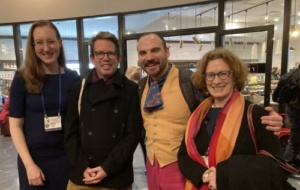ASEEES Convention 2023
 Report on ASEEES Convention 2023 (Philadelphia) for Old Members’ Trust – Jake Robertson (DPhil in Medieval & Modern Languages University College)
Report on ASEEES Convention 2023 (Philadelphia) for Old Members’ Trust – Jake Robertson (DPhil in Medieval & Modern Languages University College)
The Association for Slavic, East European, and Eurasian Studies is the largest and most prominent scholarly organization for researchers of the former Soviet Union (including Eurasia) and Eastern and Central Europe. It was a tremendous honour to be able to attend this high-profile gathering of leading academics in the field. An array of panels and roundtables were very helpful and relevant to my work.
It would have been more than worth it to attend the convention simply as a spectator.
However, I learned from my previous conference experience how valuable organizing and participating on panels could be. This time, instead of taking responsibility for just one panel (last year it was on forgotten faces of the Gulag), in concert with Alisa Ballard Lin at Ohio State University, I organized an entire series of four panels and a roundtable on the subject of Decentring Soviet Theatre and Music. This was a tremendous opportunity to meet and collaborate with theatre scholars, since most of my academic work has involved collaborations with Slavic studies or history researchers. Two of the panels I organized took place at the virtual conference in October: “Centre Stage on the Soviet ‘Periphery’” (of which I was also the chair) and “Recentring Revolutionary Women”. Both were very successful and provoked meaningful questions and conversations.
At the in-person convention from November 30 – Dec 3, 2023, I organized a roundtable event called “Decentring Soviet Music: (Dis)Harmonies on the Soviet ‘Periphery’, and two more panels: “Performing the Republics” and “Periphery Theatre as Resistance”. At the last event, I presented a paper of my own titled “Proteges on the ‘Periphery’: The Gulag Legacy of Meyerhold, Stanislavsky, and Nemirovich-Danchenko”, alongside scholars whom I deeply respect, namely Mayhill Fowler (Stetson U), Yana Meerzon (U of Ottawa), and Alisa Lin (Ohio State). I was very pleased with the reception of my paper, and the discussion afterwards showed me how invested the audience was in the content of my presentation and provided me with helpful feedback on how to take my work further. As a result of this paper, the editors of Stanislavski Studies a theatre studies peer-reviewed journal have asked that I contribute to an issue.
Finally, I was thrilled to have the chance to attend the in-person convention this year, because of the social and networking opportunities made available. I was able to organize coffees with some respected Gulag researchers (Alan Barenberg (Texas Tech), Cynthia Ruder (U of Kentucky), Stephen Barnes (George Mason), who offered valuable feedback on my work, professional guidance, and potential collaborations in the future. We were also able to organize a dinner with our panellists from the series on Saturday evening, which allowed for us all to get to know each other beforehand and added to our sense of comfort and confidence during our presentations the next morning. It also gave me the chance to ask questions and learn from my more veteran theatre studies colleagues. Overall, the convention was an even more enriching experience than I expected. My academic network, my ability to collaborate and engage with a changing field, and my own research have benefited greatly.
Find out more about the range of travel grants and scholarships available to assist Univ students on our Travel Grants page or read further travel reports.
Published: 25 April 2024
Explore Univ on social media
